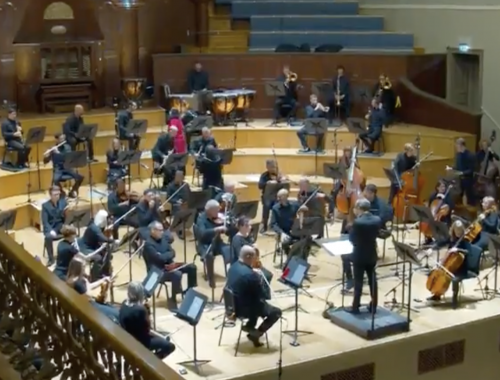Little Fish in a Big Scary Pond
Picture it: A giant flight of steep stairs, chattering professional voices coming from the top of them, and me struggling to breathe deeply from nerves before I even attempt them. I was about to embark on a new experience, undenounced to me what was waiting at the top of the steps. I chose to believe in myself and my ability to keep my cool, and I entered that room with a friendly smile. Instantly I was met with warmth, which I should have expected. These people were just like me, only a little older and a lot wiser. They had probably been where I was not too long ago. After that, I didn’t turn back!
Kabosh, more like kawow…
I currently have the opportunity to carry out my work experience placement with Kabosh Theatre Company. They are well established, have a fantastic reputation for producing high quality plays, and the Artistic Director is Paula Fetridge [1]. At the risk of sounding naïve, I’ll confess that I wasn’t even sure what Artistic Director meant before this year. Something I didn’t anticipate with this module was realising how much I didn’t know about how the world of theatre operates. Using Boud’s Model of Reflection I plan to analyse how my first few weeks of my work experience module went.[2]

Finally, some representation!
The company is working on a new write by Dominic Montague, “Callings”, which is about a group of queer people living in Northern Ireland in the 70’s. Before I began my placement, I read this, and I was elated to hear it was a queer story, a main area of interest for me. There isn’t enough LGBTQ+ representation in theatre, and as this article asks, since there are so many queer people involved in the arts, ‘where are the plays?’[3]. I enjoyed the fact that it was set during the troubles, because I had studied the politics and humanitarian struggle that Northern Ireland faced during the twentieth century in secondary school. I read the script in advance of my first day, twice, and I thought it was really fantastic!
On my first day we did a full read through with the cast and the whole company was there too. With the director Paula as facilitator of discussion, the characters and their relationships were analysed. Another topic that came up continuously was the history of Northern Ireland. I inserted myself and proclaimed that I knew loads about Northern Irish politics in the 70’s, hoping to impress. Given that I was the only person not from Northern Ireland in the room, this proved to be a mistake.

Anyone got a shovel?
Over the next week or so, I subsequently noticed that events, people, and places regarding that time period were brought up in relation to the play. These were sometimes familiar to me, but most of the time I felt confused. Initially I believed I was doing myself a favour, but in time I realised I had paralysed myself in a situation that could have been avoided. I felt inadequate compared to the rest of the company, and I wished I said nothing at all. I decided I needed to say something, so I told Paula that I really wasn’t as up to speed as I should have been. Paula understood and sent me documents that the cast were sent containing an abundance of historical facts. I studied them that night and my confidence rose.
As soon as I moved past my regret, I realised that staying silent wasn’t the way to go. Having applied this new knowledge to the script the story unravelled itself for me and I benefitted in terms of my contributions and ideas. The ability to admit when I made a mistake hasn’t always been the easiest for me, but this scenario made me feel assured that it’s worth it. This sort of learning has been described as ‘lifelong learning’, something that doesn’t not happen quickly and needs to be repeated many times in a person’s life. [4]
A jack of all trades please.
Something that was brought up in a lecture by Dr. Ali FitzGibbon was that the Arts world requires you to be flexible, a jack of all trades [5]. Theatre is created when many components work in harmony to showcase something wonderful. I’ve noticed that during the production of “Callings”, people have their official role, but there are plenty of moments where someone jumps in to help where they are needed. I have no official role as a placement student, so I have been shadowing various people such as the director, stage manager, and costume designer.

I observed the stage manager (Caitin) taking measurements of an actor for the costume designer (Erin), as he was absent when the Erin carried out the measuring. She jumped in to do it, no questions asked. It occurred to me that if I want to work in this business, the more skills I have, like being able to take measurements the correct way, the more employable I become. There was an ongoing issue whereby no one could get their hands on a prop they needed, a vintage bag from a record store. I made it my mission to find this. I visited different shops in my search with no luck. I asked my Dad to keep an eye out, and the next day he found some from Golden Discs. When I produced these at rehearsal I knew I had used my initiative and in turn had made someone’s life easier! I can’t wait to find more ways to help out and learn even more.
References:
[1] Boud, D., Keogh, R., & Walker, D, ‘Promoting Reflection in Learning: A Model. Reflection: Turning Reflection into Learning.’(London: Routledge, 1985)
[2] Kabosh, ‘About Us’, kabosh.net, https://kabosh.net/staff/post-0/ (Accessed 3rd March 2022)
[3] Emmott, Sarah ‘We need more than coming out stories to come out. Why Theatre Needs Better Queer Programming’, artwithheart.org, https://artwithheart.org.uk/why-theatre-needs-better-queer-programming/ (Accessed 3rd March 2022)
[4] Cunningham, I. Dawes, G. and Bennett, N, The Handbook Of Work Based Learning, (Aldershot: Gower, 2004) pg.31
[5] FitzGibbon, Dr. Ali, ‘Creative and Cultural Industries PPT Nov 2021’, canvas.qub.ac.uk, https://canvas.qub.ac.uk/courses/15226/files/2312135?module_item_id=682309 pg.12 (Accessed 3rd March 2022).
Simulated Interviews
How to: Be a PA
You May Also Like

Facing Avoidance
26 November 2021
In at the Deep End: Recording an Orchestra
26 November 2021
